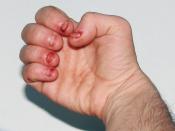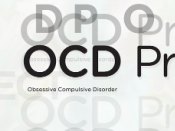Obsessive Compulsive Disorder, is a frightening anxiety disorder, and before we attempt to look at the types of treatments used, and their effectiveness, it is important that we have an understanding of the basic theories behind the disorder.
As its name suggests, in obsessive-compulsive disorder (OCD), the profound sense of anxiety is reflected in obsessions, and compulsions. Obsessions are recurrent thoughts, or images that do not feel voluntarily controlled, and are experienced as senseless, or repugnant. Compulsions are irresistible urges to engage in repetitive behaviours, which are performed according to rituals or rules as a way of reducing or preventing the discomfort associated with some future undesirable event. As Tallis (1994) has remarked OCD has undergone a dramatic change in status over the last decade. Whilst it was once regarded as a rare example of the neuroses, it now occupies a central position in clinical psychology, and contemporary psychiatry.
In America OCD is the fourth most common disorder, and in the U.K, an estimated one to one and a half million people suffer from it. OCD affects slightly more females than males, and it usually begins in early adulthood.
Frequently, the obsessive thoughts take the form of violent images, such as killing oneself, or others. However, such thoughts can take other forms. According to Sanavio (1988), the four most common obsessional characteristics are, impaired control over mental processes, such as repetitive thoughts of the death of a loved one; concern over losing control over motor behaviours, such as killing someone; contamination, being contaminated by, for example germs, and; checking behaviours, such as concern over whether a door has been locked. Whatever form they take, such thoughts cannot be resisted and provide no joy to the sufferer.
Often, a compulsion arises from an obsession. A person, for example who persistently...


